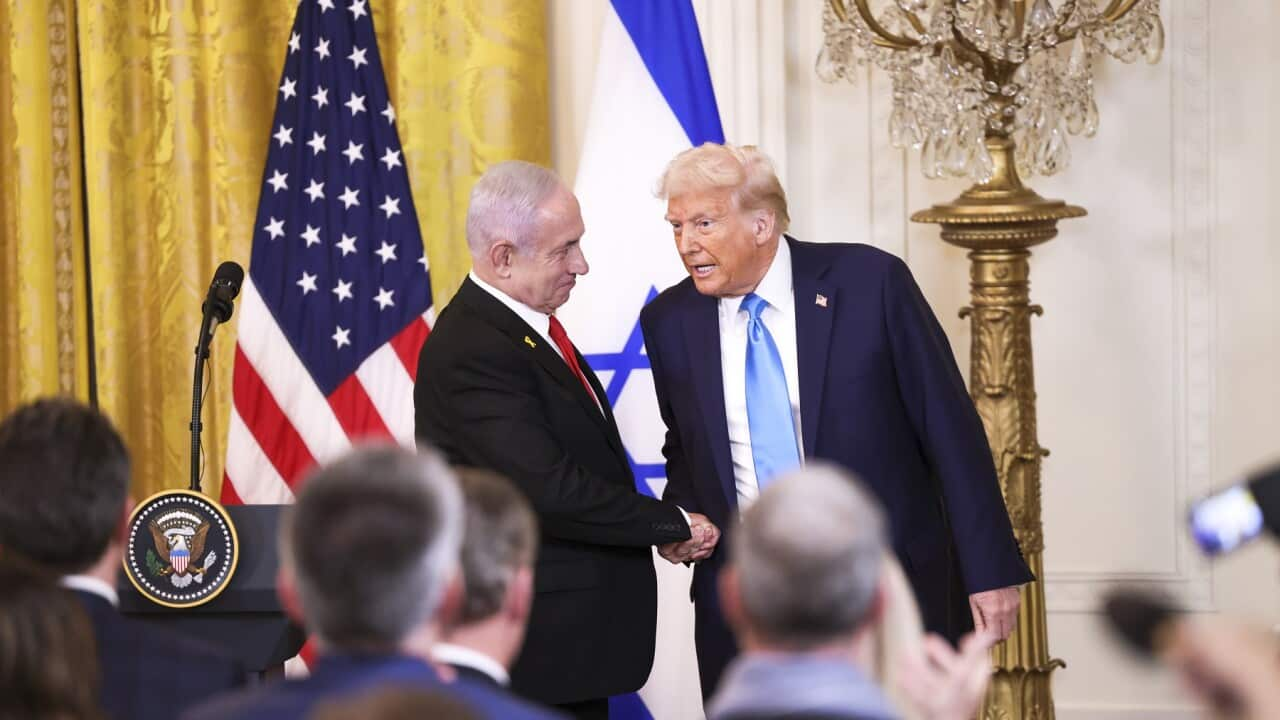TRANSCRIPT
President Donald Trump has signalled his intention to explore a US conquest of Gaza involving the permanent resettlement of 1.8 million internally displaced Palestinians.
It's a proposition that has been flatly rejected by Arab countries, including Egypt and Jordan, the nations that Mr Trump is hoping will absorb those displaced.
The comments come after a meeting between President Trump and Israeli Prime Minister Benjamin Netanyahu at the White House.
"I don't think people should be going back to Gaza. I think that Gaza has been very unlucky for them. They've lived like hell. They lived like you're living in hell. Gaza is not a place for people to be living, and the only reason they want to go back, and I believe this strongly, is because they have no alternative. What's the alternative, go where? There's no other alternative, if they had an alternative. They'd much rather not go back to Gaza if they had a beautiful alternative that's safe."
Mr Trump says the whole population should be "resettled in areas where they can live a beautiful life and don't have to be worried about dying every day".
He also says the US will "take over" and "develop" the territory.
"I do see a long-term ownership position, and I see it bringing great stability to that part of the Middle East, and maybe the entire Middle East, and everybody I've spoken to - this was not a decision made lightly - everybody I've spoken to loves the idea of the United States owning that piece of land, developing and creating thousands of jobs, with something that will be magnificent in a really magnificent area that nobody would know, nobody could look because all they see is death and destruction and rubble and and demolished buildings falling all over just a terrible, terrible sight."
The former real estate mogul outlined how the United States could clear the rubble of a 15-month war and create something more akin to an idyllic holiday spot.
"We have an opportunity to do something that could be phenomenal. And I don't want to be cute, I don't want to be a wise guy, but the Riviera of the Middle East, this could be something that could be so magnificent."
Benjamin Netanyahu signalled his support for the idea and praised Mr Trump as "the greatest friend Israel has ever had in the White House".
"I think it's something that could change history. And it's worthwhile really pursuing this avenue."
The Israeli Prime Minister laughed and smiled as he thanked Mr Trump for releasing more weapons to the Jewish state, lifting sanctions on settlers in the West Bank, and revoking funding for the UN aid agency that supports the Palestinian population in the Gaza strip, where health authorities say more than 47,000 people have been killed since the war broke out.
A further 14,222 people are still believed to be trapped under the rubble or in areas inaccessible to rescuers, and are presumed dead, according to the head of the Gaza Government Information Office.
"Ladies and gentleman, all this in just two weeks, can we imagine where we'll be in four years?"
The international reaction has been very different.
Donald Trump first floated the idea of depopulating Gaza and resettling the Palestinian population as refugees on January 25.
On Monday, the foreign ministers of Egypt, Jordan, Qatar, the United Arab Emirates and Saudi Arabia rejected the plan in a joint letter to US Secretary of State, Marco Rubio.
Hamas also issued a written statement today, with senior official Sami Abu Zuhri saying:
"We consider it a recipe for creating chaos and tension in the region. Our people in the Gaza Strip will not allow these plans to pass. What is required is an end to the occupation and aggression against our people, not their expulsion from their land."
A similar response yesterday from Türkiye's foreign minister, Hakan Fidan, even before Mr Trump outlined his plan for U-S ownership of the Gaza Strip.
"The Palestine problem started with the displacement of the Palestinians. While we defend the idea that in order to solve this problem permanently, (saying) the Palestinians should be granted the right to a state on their land and that this conflict and dispute should be ended with a two-state solution. Coming up with another proposal on the contrary actually means not reading history well."
Perhaps the most significant and strategic regional player, Saudi Arabia re-iterated its rejection of Mr Trump's plan this afternoon, saying a two-state solution remains a neccesary pre-condition to normalised relations with Israel.
This is likely to hold sway with President Trump, who has made no secret of his ambition to bring the two countries together.
On the home front, Prime Minister Anthony Albanese has also outlined Australia's stance, after being asked about Mr Trump's comments today.
"What I would say is Australia's position is the same as it was this morning, as it was last year, and it was ten years ago, and it was under the Howard government: the Australian government supports on a bipartisan basis a two-state solution in the Middle East."
But as negotiations for a second stage to the Gaza ceasefire get underway, somehow the prospect of a two-state solution seems more remote than ever.













